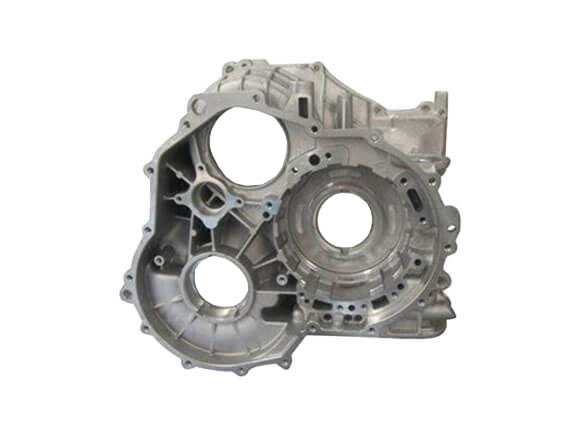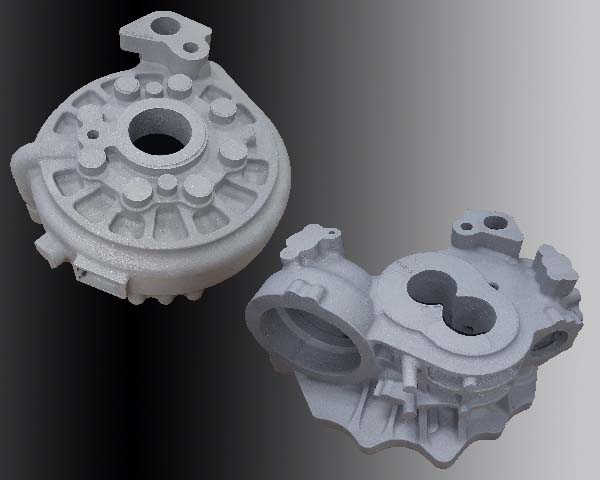The modern approach of manufacturing with Precision aluminum casting
Exactly How Factory Solutions Enhance Manufacturing Performance and High Quality in Industrial Applications
Factory services play a vital duty in boosting manufacturing efficiency and top quality throughout numerous commercial applications. By applying innovative metal casting strategies, these solutions ensure components are made with precision and consistency. This not only lowers lead times but additionally lessens waste, cultivating much better collaboration in between producers and factories. The influence of top notch parts on functional performance elevates crucial questions regarding the future of industrial manufacturing. What advancements lie in advance in this developing landscape?
The Duty of Factory Solutions in Streamlining Production Processes

Shops usually supply competence in alloy advancement, allowing producers to use advanced products that improve item performance. The cooperation between makers and factories cultivates a much better understanding of manufacturing needs, causing optimized processes and improved item designs. By leveraging foundry services, makers can achieve better flexibility, adapt to transforming market needs, and maintain competitiveness in the industry. In general, the duty of factory solutions is vital in helping with a much more efficient and affordable production landscape.
Advanced Technologies in Shop Workflow
Ingenious technologies are transforming foundry procedures, markedly improving performance and precision. Automation plays an important duty, with robotic systems simplifying repetitive tasks such as molding and material handling. Furthermore, advancements in computer-aided style (CAD) and computer-aided production (CAM) systems allow factories to create intricate geometries with higher accuracy and decreased material waste.
The assimilation of fabricated intelligence (AI) and maker discovering improves high quality control by keeping an eye on procedures in real-time and predicting prospective flaws before they take place. Using advanced materials, such as light-weight alloys and composites, further enhances the efficiency qualities of actors products.
3D printing modern technology is revolutionizing prototyping and tooling, allowing for quick personalization and lowered lead times. Jointly, these sophisticated innovations not just raise manufacturing effectiveness yet also assure that the end products fulfill rigorous top quality requirements, positioning shops at the center of modern-day industrial applications.
Minimizing Lead Times Through Reliable Shop Practices
Efficient factory methods play an essential function in minimizing lead times within production atmospheres. By executing structured production processes and advanced scheduling techniques, makers can enhance operations and maximize resource allotment. These renovations not only increase result yet likewise add to overall functional performance.
Streamlined Manufacturing Procedures
Simplifying production processes is vital for minimizing preparations in the manufacturing market. Reliable foundry practices, including maximized operations and resource administration, play an essential role in achieving this objective. By minimizing waste and improving interaction among teams, shops can greatly improve their functional efficiency. The implementation of standardized procedures also contributes to regular quality and faster turnaround times, enabling suppliers to respond more swiftly to market demands. In addition, the combination of innovative modern technologies, such as automation and real-time tracking systems, helps in identifying traffic jams and promoting prompt treatments. Overall, a focus on structured production procedures not only increases preparations but likewise enhances the total competitiveness of industrial applications, guaranteeing that products meet client assumptions properly.
Advanced Organizing Techniques
Efficient production procedures naturally lead manufacturers to check out advanced organizing methods as a way to better lower lead times. By using innovative formulas and software program, shops can enhance workflows, aligning production schedules with demand forecasts and source schedule. Strategies such as Just-In-Time (JIT) organizing reduce supply prices while ensuring timely product shipment, thereby boosting operational performance. Additionally, integrating real-time data analytics enables shops to anticipate prospective delays and change routines proactively. This versatility not only simplifies operations yet likewise improves total performance. Collaborative preparation with providers index and clients can promote a more synchronized supply chain, additional minimizing lead times. Inevitably, these advanced scheduling strategies empower shops to accomplish higher effectiveness and remarkable quality in their manufacturing procedures.
Guaranteeing Precision and Quality in Metal Casting
Ensuring precision and quality in metal casting needs a careful approach that includes every phase of the manufacturing process. This process begins with cautious layout and design of the mold and mildews, assuring they can hold up against the molten metal's temperature level and stress. The choice of premium raw products is necessary, as pollutants can jeopardize the end product.
As soon as the products are prepared, specific temperature control during melting and pouring is essential to achieve the preferred residential or commercial properties in the cast steel. Keeping track of solidification and cooling rates further assurances dimensional precision and surface coating.
Quality control methods, such as non-destructive screening and examination, are essential to determining flaws early at the same time. Precision aluminum casting. Additionally, employing competent personnel that comprehend the subtleties of steel casting adds considerably to preserving high requirements. In general, these techniques jointly boost the dependability and efficiency of cast elements in different industrial applications
Decreasing Waste and Maximizing Source Application

Furthermore, recycling scrap steel within the foundry itself can significantly reduce waste, changing byproducts right into useful sources. Lean making principles also add to throw away reduction by improving processes and eliminating unneeded steps, leading to more effective procedures.
In addition, regular upkeep of devices guarantees peak efficiency, avoiding break downs that can lead to wasted materials. By concentrating on these methods, foundries not just reduce expenses however also add to sustainable practices, aligning with the expanding demand for environmentally accountable manufacturing approaches in commercial applications.
The Affordable Benefit of High-Quality Elements on the market
Premium components provide a significant affordable advantage in the shop market, where precision and durability are extremely important. Makers that focus on superior products and workmanship can enhance item performance and dependability, resulting in enhanced consumer satisfaction. This benefit is specifically obvious in industries such as automobile and aerospace, where part failure can have catastrophic click for more info effects.
In addition, top quality parts often result in lower upkeep costs and extended product life-spans, which can be appealing look at this site marketing points for potential clients. As market demands expand for efficient and lasting technologies, the focus on quality ends up being a lot more important. Business that spend in premium shop services not just improve their production processes but likewise differentiate themselves from competitors that might compromise quality for expense financial savings. As a result, the dedication to top quality components inevitably converts into a more powerful market setting and lasting service success.
Often Asked Concerns
What Sorts of Materials Do Factory Provider Commonly Work With?
Foundry services generally deal with steels such as aluminum, iron, brass, and steel, together with different alloys. They likewise deal with materials like porcelains and composites, catering to varied commercial demands and specs in manufacturing procedures.
How Do Factory Solutions Impact Overall Supply Chain Monitoring?
Factory solutions considerably improve supply chain monitoring by simplifying material sourcing, reducing preparations, and guaranteeing regular top quality. Their ability to offer customized remedies fosters cooperation among stakeholders, eventually improving overall operational performance and responsiveness in production.
What Industries Benefit The Majority Of From Factory Solutions?
Industries such as automotive, building and construction, aerospace, and customer products significantly take advantage of foundry services. These markets rely upon accuracy spreadings to meet rigorous high quality criteria and enhance their overall manufacturing processes and item performance.
Are Foundry Solutions Environmentally friendly and sustainable?
Factory services can be ecologically friendly and lasting, especially when using sophisticated technologies and procedures - Aluminum Foundry. Advancements such as reusing products, reducing emissions, and enhancing energy usage contribute to minimizing their eco-friendly impact in commercial applications

How Can Firms Select the Right Foundry Provider?
Companies can select the right shop company by examining experience, production capacities, top quality accreditations, modern technology used, consumer reviews, and sustainability methods while ensuring alignment with their details job needs and long-term service objectives.
Factory services play a necessary function in improving manufacturing performance and quality across numerous commercial applications. The collaboration between producers and factories promotes a far better understanding of production requirements, leading to optimized procedures and enhanced item designs. Reliable foundry practices play a vital function in decreasing lead times within manufacturing atmospheres. By employing sophisticated algorithms and software application, shops can maximize workflows, straightening production timetables with demand forecasts and source schedule. Companies that invest in high-grade foundry services not only improve their manufacturing processes but also distinguish themselves from rivals who might sacrifice quality for price savings.